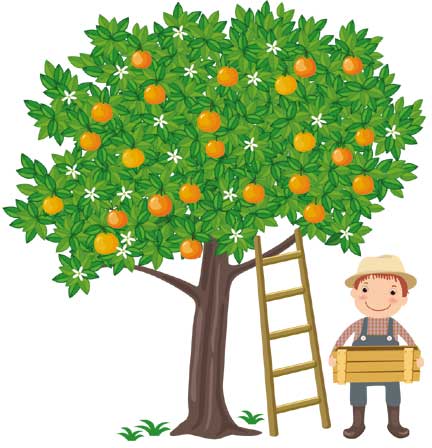Green practices sustain our health, guard against fires, save money, increase home values, and create self-sufficiency.
 If you have fruit trees with excess fruit that you can’t or don’t want to use, the TOT Picking Posse will stop by your home with your permission, pick the fruit, and leave the surplus for anyone in our community. Please contact Mary at 424.259.2407.
If you have fruit trees with excess fruit that you can’t or don’t want to use, the TOT Picking Posse will stop by your home with your permission, pick the fruit, and leave the surplus for anyone in our community. Please contact Mary at 424.259.2407.- The TOT Rake Squad will rake your yard for free! To sign up for a visit, contact Kara at karabeaming@gmail.com.
- TOT-specific native plants are now being demonstrated in our Native Plant Gardens and we have documented more Native Plants in TOT, most of which grow wild. For more recommendations for our location, visit The California Native Plant Society website. See the Theodore Payne Foundation Plant Guides for how to garden in harmony with animals and insects.
 Children’s educational coloring pages from Raptors Are The Solution (RATS).
Children’s educational coloring pages from Raptors Are The Solution (RATS).
- Non-toxic insect DIY deterrents include cleaning with Simple Green, spreading cinnamon or peppermint oil, or using Orange Guard spray (available at Whole Foods). Vendors who do not use toxins are:
- If your gardener uses eco-friendly alternatives, we will list their contact info here. Please contact the web team. When hiring a landscaper/gardener, please consider asking if they…
… protect air quality by using electric and/or hand powered equipment?
… use California native or non-invasive Mediterranean plants, and fire retardant varieties when possible?
… use compost for non-native plants to feed the soil?
… use mulch for native plants to feed the soil and suppress weeds?
… use non-toxic and humane pest management?
… install and/or maintain water irrigation systems, including zoning where needed?
… prune selectively and properly?  Free mulch is available from the City of LA. Laid over soil surface, mulch discourages tweeds and evaporation. Organic rocks, pebbles, and composted wood chips can also be goodchoices, but avoid mulches that are combustible.
Free mulch is available from the City of LA. Laid over soil surface, mulch discourages tweeds and evaporation. Organic rocks, pebbles, and composted wood chips can also be goodchoices, but avoid mulches that are combustible.- Free rain barrels, grass removal incentives, and water conservation tips are available from the West Basin Municipal Water District. Information on water conservation and the cash for grass program is available at Los Angeles County Waterworks District (serving TOT). See also Water-Wise Gardening, LA County Public Works.
Green practices
1. Corded or battery-operated electric leaf blowers and raking as eco-friendly alternatives to polluting gas-powered blowers. Blowers with vacuum mulching provide extra benefit, when mulch is composted or applied to gardens, and keep debris off of streets and properties. See How to Make Compost At Home (on the Happy DIY site) or Compost (Wikipedia). To avoid rodent infestation, use contained bin composters.
2. Alternatives to rodenticides that endanger people and pets and kill rodents’ natural predators. Sealing points of entry into homes, keeping yards free of food, and using snap traps are better alternatives (see Wild Things).
3. Alternatives to toxic insecticides that endanger people and pets and kill wildlife. Planting a variety of native plants for native insects to enjoy promotes a healthy ecosystem. Butterfly larvae need native plant leaves to eat and develop. If a garden gets out of balance, use diatomaceous earth (on the How To Get Rid Of site), horticultural oil, or insecticidal soaps. See also Effective and Safe Alternatives to Pesticides.
4. Alternatives to toxic herbicides, such as Roundup, that endanger people and pets and kill wildlife. If a garden gets out of balance, use diatomaceous earth (on the How To Get Rid Of site), and/or horticultural oils and insecticidal soaps. Other alternatives include use of native plants, mulching (see #5 below), pulling, permaculture, boiling water, and saturated steam.
5. Native, low-water, fire-resistant plants that make yards easy to maintain and eco-friendly. Trimming isn’t needed for unnatural shape or size, only for safety or tree health. See Landscape for reading suggestions and other info.
6. Compost your organic vegetative refuse to enrich your garden. Use a closed system reduce access and infestation by rodents, such as this tumbler composter on Amazon.